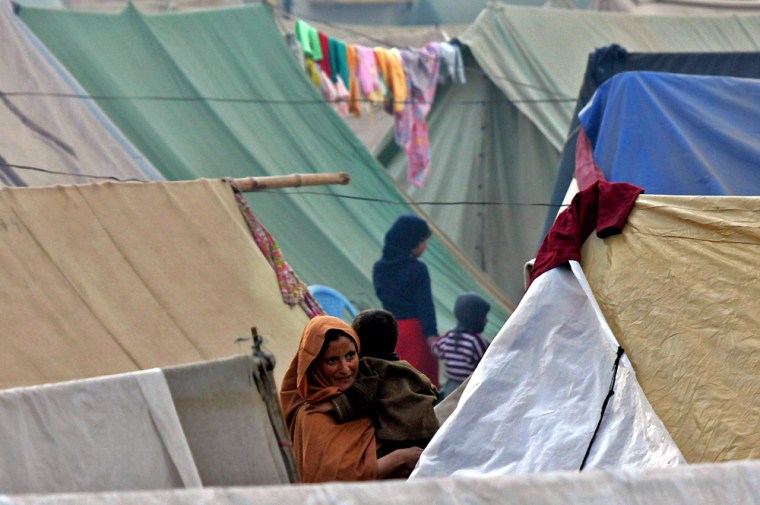Health workers rushed Wednesday to contain an outbreak of acute diarrhea afflicting hundreds of earthquake survivors at a crowded, unsanitary camp on a soccer field here in the capital of Pakistan’s part of Kashmir.
Meanwhile, porters carried emergency supplies on foot across the Line of Control dividing Kashmir as Pakistan and India took another small step toward opening the disputed border in the Himalayan territory where the quake left hundreds of thousands homeless.
Tent camps have sprung up in towns and cities across the region, housing local residents and people who fled distant villages that relief workers have struggled to reach.
Most camps were set up with official sanction and have sanitary facilities. But others have grown haphazardly wherever people find space, such as the camp on the sports field next to the devastated university in Muzaffarabad, the main city of Pakistani Kashmir.
Since the quake, about 3,000 people have gravitated to the field. Living in tents, many barely a yard apart, they share a handful of clogged latrines and wash themselves above a stinking ditch of stagnant water.
Dysentery reported
Humanity First, a German charity that provides health care at the camp, reported an alarming rise in acute diarrhea cases, including dysentery, in the past week.
Dr. John Watson of the World Health Organization said more than 200 such cases had been reported at the camp in the past week — none fatal.
Acute diarrhea can cause life-threatening dehydration and can indicate the presence of deadly illnesses like as cholera, but WHO officials said there was no immediate evidence of that at the camp.
Watson said a treatment tent was being set up nearby on the college grounds, new latrines dug and a better water supply provided.
On Wednesday, medics treated more than 30 patients — many of them young children — in two tents pitched side-by-side in the camp. They used oral rehydration salts for most, but for severe cases hooked patients to intravenous drips.
“It’s easy to treat, but if a patient does not get treatment he will die,” Cuban Dr. Roberto Cruz Montesino said from behind a surgical mask as he examined patients on beds and benches.
Among the worst cases was 13-year-old Sadiq, who suffered diarrhea and vomiting for five days but had regained enough strength by Wednesday afternoon to sip fluid from a beaker fashioned from the top of a plastic bottle.
Winter could bring more fatalities
Aid officials have warned that the coming winter and squalid camp conditions could bring a new wave of deaths. About 87,000 people died during the Oct. 8 quake in Pakistan and 1,350 were killed in India.
Wednesday’s exchange of relief supplies between Pakistan and India was the second since the nuclear-armed rivals agreed after the quake to an unprecedented opening of five frontier crossings to ease aid efforts in Kashmir.
Indian workers lugged hundreds of sacks of rice from their side of the Chakothi-Uri crossing and handed them to Pakistani porters in the middle of a dry riverbed beneath a collapsed bridge. Pakistan reciprocated with dozens of bags of blankets and clothing.
Both sides hope to soon allow civilian crossings. To the anger of many Kashmiris, such crossings have been delayed, partly because the two sides need to screen lists of travelers. India wants to keep out Islamic separatists waging an insurgency in its portion of Kashmir.
A predominantly Muslim region, Kashmir was split between India and Pakistan in 1947 after independence from Britain. Both countries claim the entire territory in a dispute that has kept many Kashmiri families separated for nearly 60 years.
